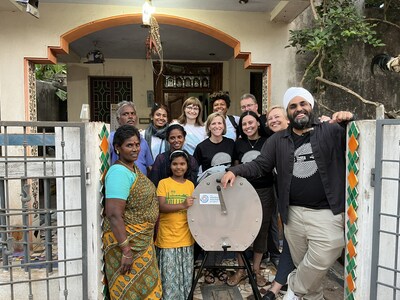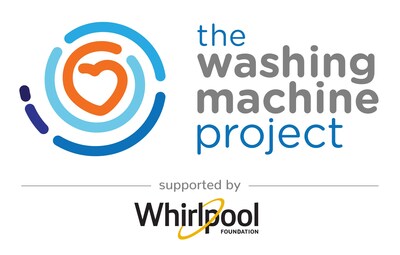Half the Global Population Washes Clothes by Hand: Whirlpool Foundation, The Washing Machine Project Helping Address with Thousands of Manual Washing Machines
Global collaboration will help unlock millions of hours for women and girls to improve quality of life, saving time for learning and income-generating activities
In its first five years, the collaboration will help unlock approximately 17 million2 hours for women and girls to improve quality of life and halve overall water usage, bringing efficient and sustainable washing solutions where they are needed most. According to the World Health Organization,
"We are honored to partner with the Whirlpool Foundation, whose legacy as a pioneer in home appliance innovation is only superseded by their passion to foster community development and improve life at home for people around the world," said Navjot Sawhney, founder and CEO of The Washing Machine Project. "This collaboration is a testament to what can be achieved when compassion meets technology. Together we are set to revolutionize laundry practices globally, paving the way for a more equitable and prosperous future for hundreds of thousands of people."
The collaboration is funded through the Whirlpool Foundation, with employee volunteers helping The Washing Machine Project refine the design and assemble the Divya Washing Machine, and The Washing Machine Project managing the distribution of the devices.
Divya Washing Machine Impact
At the initiative's core is the Divya Washing Machine, the world's first flat packable manual washing machine that allows users to wash their clothes without electricity or a connected water source. Its simple design reduces the need for prolonged physical effort usually required to hand wash clothes, replaced instead with a simple manual machine that can be used frequently and safely, saving the user up to
As a portable unit, built with commercial-grade components and stainless-steel construction, the machine is easier to be fixed remotely and has the potential to be recycled at the end of its life.
Divya, the namesake of the machine, is named after Navjot Sawhney's former neighbor, whom he became close friends with during a work assignment in
"We greatly admire the mission and work of The Washing Machine Project and see an opportunity to help impact more lives collectively than either of us could individually," said Pam Klyn, Whirlpool Corporation executive vice president, corporate relations and sustainability. "Driven by shared passion and purpose, Whirlpool Corporation employees are lending their time and talents to help make this long-term vision a reality, recognizing that this initiative goes beyond washing clothes. It is about reclaiming time and improving lives for these individuals who will now spend much less time doing laundry which opens the door to new opportunities."
In the first five years of its collaboration with Whirlpool Foundation, distribution is planned for underserved populations in rural and urban areas in
Since The Washing Machine Project was founded in 2019, the organization has conducted ethnographic research in 13 countries and interviewed more than 3,000 families in
About Whirlpool Foundation
Since 1952, the Whirlpool Foundation has been making real, positive differences in local communities where Whirlpool Corporation families live and work. This is accomplished through two central pillars: House + Home. "House" supports a decent and affordable place to live and plan for the future, and "Home" focuses on creating thriving, resilient communities with the essential services, quality education, and job training needed to help people dream bigger and do better. The Foundation has an absolute commitment to equality and fairness and takes an innovative approach to social investing that prioritizes impact with measurable results.
About The Washing Machine Project
The Washing Machine Project is a grassroots social enterprise based in the
Citations and Supporting Global Laundry Facts:
- Source/citation: The report estimates the resource consumption of roughly 590,000,000 washing machines in 38 countries with about 2.3 billion people, which is about one third of the world population. [1] According to various sources, including the United Nations Human Settlements Programme, only 2 billion people today have access to washing machines, while the remaining 5 billion individuals, particularly women, resort to hand washing clothes, a labor-intensive and time-consuming task involving fetching water, heating it, and manual washing. [2][3][4] Notably, Hans Rosling, a renowned data analyst, states that since the 1950s, washing machines have become ubiquitous for approximately 2 billion people worldwide. [5] Rosling also highlights that around 2 out of 7 billion people globally have access to washing machines, leaving approximately 5 billion individuals, or
71.4% , who still hand wash their clothes. [6] The global population rose to 6.9 billion in 2010, with nearly all of that growth occurring in the world's developing countries. [7] Utilizing the mathematical equation ((6.9 - 2.3) / 6.9) * 100 =66.6% , we can approximate that around60% of the world's population washes clothes by hand. - Source: The Washing Machine Project
- Source: The Washing Machine Project
![]() View original content to download multimedia:https://www.prnewswire.com/news-releases/half-the-global-population-washes-clothes-by-hand-whirlpool-foundation-the-washing-machine-project-helping-address-with-thousands-of-manual-washing-machines-302115950.html
View original content to download multimedia:https://www.prnewswire.com/news-releases/half-the-global-population-washes-clothes-by-hand-whirlpool-foundation-the-washing-machine-project-helping-address-with-thousands-of-manual-washing-machines-302115950.html
SOURCE The Washing Machine Project; Whirlpool Foundation









